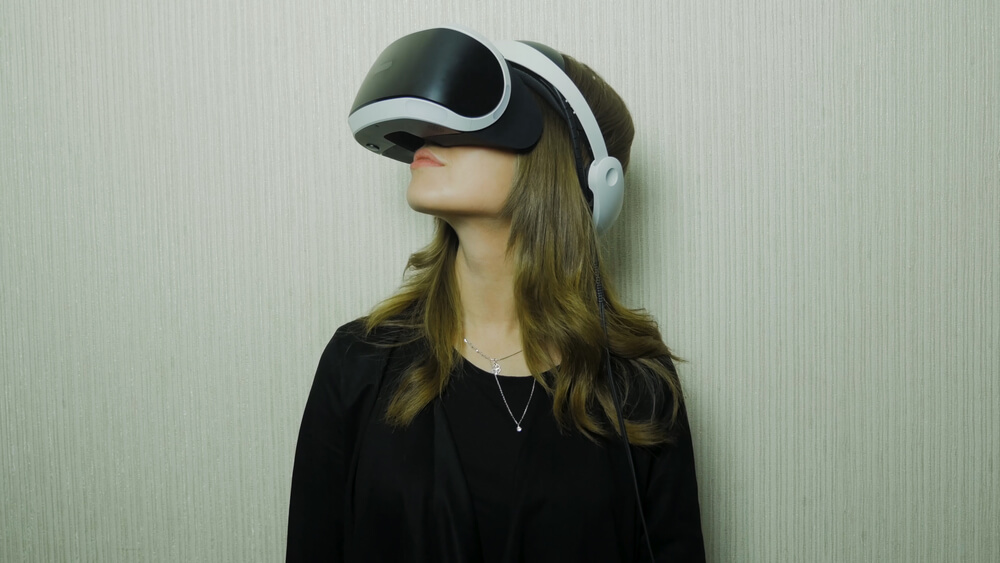Virtual reality (VR) is one of the hottest forms of gaming and socializing. VR users put on a headset that projects images in front of them to give an illusion of being in the middle of a virtual world. While this effect creates an experience unlike any other, some medical experts have concerns and have you wondering, “is VR bad for your eyes?”
Virtual reality has exploded in popularity in the past few years. While some may think of it primarily as a gaming innovation, users have found ways to incorporate VR into social media, watching sports, and browsing the internet. So, let’s answer the question, “is VR bad for your eyes?”

How VR Affects Eye Health and Is VR Bad for Your Eyes
With the increase in VR usage, optometrists have raised concerns about the technology causing increased digital eye strain. Digital eye strain is the most critical of the VR effects on eyes and is why people ask, “is VR bad for your eyes?” Some eye strain symptoms include:
- Headache
- Blurry vision
- Watery eyes
- Neck pain
- Eye redness
- Fatigue
- Dry eyes
Human eyes haven’t evolved to look at screens all day. Our eyes must do extra work to focus and process the information on screens. Staring at screens too long can cause computer vision syndrome and lead to eye issues. VR eye strain is a cause of computer vision syndrome, and it’s one of the reasons people say yes when considering “is VR bad for your eyes?”
Whether your symptoms come in dry eyes or blurry vision, there are ways to mitigate VR eye strain and VR effects on the eyes. With so many potential issues, it is easy to consider that VR is bad for your eyes. But with proper procedures, optometrists believe you can avoid the effects of VR eye strain.
The most common effect people experience in VR is motion sickness. It’s somewhat different from traditional motion sickness; scientists have taken to calling it cybersickness. When people wonder about the question, “is VR bad for your eyes?” they are thinking about cybersickness symptoms.
Cybersickness differs from motion sickness in that you are not physically moving in a virtual environment. Instead, virtual reality is tricking your brain into thinking it’s moving. The dissonance between the sensation of movement and the stationary nature of virtual reality leads to cybersickness.
Cybersickness is the most common of the VR effects on the eyes and could lead you to think there’s something to “is VR bad for your eyes?” The symptoms you may feel include, but are not limited to:
- Headache
- Nausea
- Difficulty with balance
- Dizziness
- Sweat
- Breathing issues
So, while the answer to “is VR bad for your eyes?” is a firm no, the technology will affect you if used too long or improperly.
Current Research Findings on How VR Affects the Eyes
Doctors recommend keeping at least two feet between your eyes and a screen. But VR goggles work inches from your eyes, meaning you will have difficulty avoiding eye strain. The closeness is one of the reasons people ask, “Is VR bad for your eyes?”
Virtual reality headsets create their illusion with an image on a flat screen that your eyes distort to make it appear you are in the virtual world. Optometrists believe the distortion could lead to queries like “is VR bad for your eyes?” having troubling answers, like the development of heterophoria.
Most VR effects on the eyes are temporary but worth keeping in mind.
Scientists have not found any long-term negative impact on the eyes through using virtual reality headsets. VR is not bad for your eyes in the long term, but you should take precautions to protect your vision. Scientists have studied whether VR is bad for children’s eyes. Manufacturers have age limits that begin in the teenage years. Many children will still use a VR headset, and parents may worry that questions like “is VR bad for your eyes?” could have different answers in the long term.
Luckily, there is no link scientists can find between long-term development and using virtual reality headsets. Too much screen time is still a concern for children; some scientists believe it can cause myopia. However, with mitigation efforts and limited usage, VR is not bad for your eyes.
Benefits of VR Usage
It is easy to focus on the negatives when considering “is VR bad for your eyes?” but virtual reality technology has benefits for users’ eyes. Some programs have therapeutic benefits for users, including:
- Hand-eye coordination
- Perceiving depth
- Amblyopia
- Coordination
- Reaction speed
While overuse means VR could be bad for your eyes, proper therapeutic applications have benefits for anyone.
How to Minimize the Risks of VR
With so many potential VR effects on the eyes, it’s easy to ask yourself, “is VR bad for your eyes?” Thankfully, there are several ways to avoid the risks.
You should take frequent breaks when using a virtual reality headset. Manufacturers recommend you take a break every 30 minutes.
Frequently blink when you use a VR headset. Your eyes are prone to drying out with a screen so close to them, so constantly blinking helps lubricate your eyes. Conversely, you could use eye drops to assist your eyes in staying wet.
If you use corrective vision in everyday life, you should also use it with VR. After all, you’ll constantly be straining them to see the images. Wear your glasses or contacts before you don your headset, so you don’t have an unfortunate answer to “is VR bad for your eyes?”
Several companies have begun selling inserts for VR headsets that use your prescription. If you wear glasses and cannot use them with your headset, a prescription insert will help mitigate VR eye strain.
Book Your Comprehensive Eye Exam Today!

So, is VR bad for your eyes? Scientists say there are no long-term VR effects on the eyes. If you take frequent breaks and use corrective vision, you will wonder why people ask, “is VR bad for your eyes?”
If you are having eye issues, our team at Art of Optiks can help get you the help you need. Book a comprehensive eye exam at our locations in Edina or Wayzata, and we will eliminate any eye issues you may have from overexposure to virtual reality. Contact Art of Optiks today!

